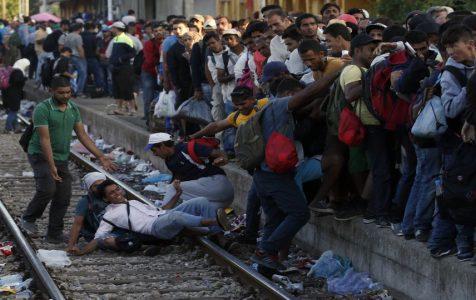
Migrant crisis – Albania the next stop for stranded refugees?
A country with its own recent history of migration could soon find itself at the centre of Europe’s refugee crisis.
They came in their thousands overnight, wearing tattered clothes, some carrying children. Braving sub-zero temperatures they clambered on foot across the snowy, craggy terrain of the Albanian mountains. Meanwhile, more children died on Europe’s shores as yet another boat carrying around 60 refugees capsized in the Adriatic Sea after colliding with an Italian navy vessel trying to stop it entering Italian waters.
Such reports were commonplace throughout the 1990s as tens of thousands of Albanian refugees fled the collapsing Communist dictatorship of Enver Hoxha and subsequent lawlessness in the Adriatic state.
Today, the political landscape in Albania has settled somewhat, yet a little over 100km away on the Greek-Macedonian border tens of thousands of mainly Syrian and Iraqi refugees continue to amass.
The recent closure of the Balkan route and the rapidly escalating humanitarian crisis in Greece is leading many to wonder if Albania is about to see the migration flow divert through its territory, prompting renewed scenes of struggle over land and sea in yet another frontier of Europe.
Entering Albania through Greece, the terrain seems hostile – jagged mountains, sudden abysses and dense woodland stretch out to the horizon and signs along the motorway warn of bears and wolves.
But some observers, like Vassilis Nitsiakos, a professor of history at the University of Ioannina, in northern Greece, think that the 280km border is penetrable to those with the right information.
“I have walked across that border illegally many times. I go with my students,” Nitsiakos laughs. “Last summer we drove 20 minutes to the border near Konitsa in Greece, then after two hours we were in Albania.
“It’s a very historical path, thousands of Albanian migrants have used it and still do, coming to work in Greece by day, and go back to their village at night. We didn’t see any police, nobody cares. It’s an open secret, the authorities tolerate it. So if the refugees today knew about it, they could do it. The question is, do they have a way out of Albania?”
Details continue to be hammered out over the deal reached on Tuesday between the European Union and Ankara, which would see all refugees and migrants reaching the Greek islands returned to Turkey. But, in the meantime, it is inconceivable that the mounting numbers on the Macedonian border could willingly be taken back, or remain in a state of suspended animation, far from their desired destinations in northern Europe.
But even if refugees manage to penetrate Albanian territory, does the impoverished country possess the infrastructure to accommodate them?
For Marie-Helene Verney, speaking to Al Jazeera in UNHCR’s Tirana office, the answer is a resounding no.
“They have military barracks on the southern border – they say they are ready to be used as accommodation but they are not. They are understaffed and under-resourced. There is a real question mark here. Imagine, there are thousands people in Greece and as soon as you look at Albania, after a few hundred the capacity is overwhelmed very quickly.
“Then what happens? The Albanian government has been extremely reluctant to engage publicly in any planning because they say ‘if we talk about it to the media, then refugees will start to come’. But we tell them, ‘they will come whether you plan or not’.”
At Karrec, Albania’s only detention centre for ‘irregular migrants’, located at the end of a winding uneven road outside a suburb of the capital Tirana, the tiny scale of the country’s capabilities becomes apparent.
Albania has a re-admission agreement with Greece, where migrants captured across the border can be returned after 14 days. But when Al Jazeera visited the facility it was empty. The only evidence of previous occupants was some abandoned clothes hanging on a washing line and Arabic graffiti scrawled on the walls of the prayer room.
Sitting in his office, centre director Gezim Goci casts a wary eye at a TV broadcasting fuzzy news footage of refugees on the Macedonia border. Rain lashes at the window and thunder shakes the room. Goci starts to reminisce and draw historical comparisons to today’s refugee flows.
“My family is from eastern Albania. During the Kosovo war in 1999 the state was not functioning, so we opened our houses to our brothers coming across the border. And when I see these young people from Syria, I feel for them,” he says.
“But there is humanity, and then there is the law. Back in the times of the dictatorship, there were many armed guards and surveillance on the border, but that was to stop us from leaving!”
Source: Al-Jazeera





